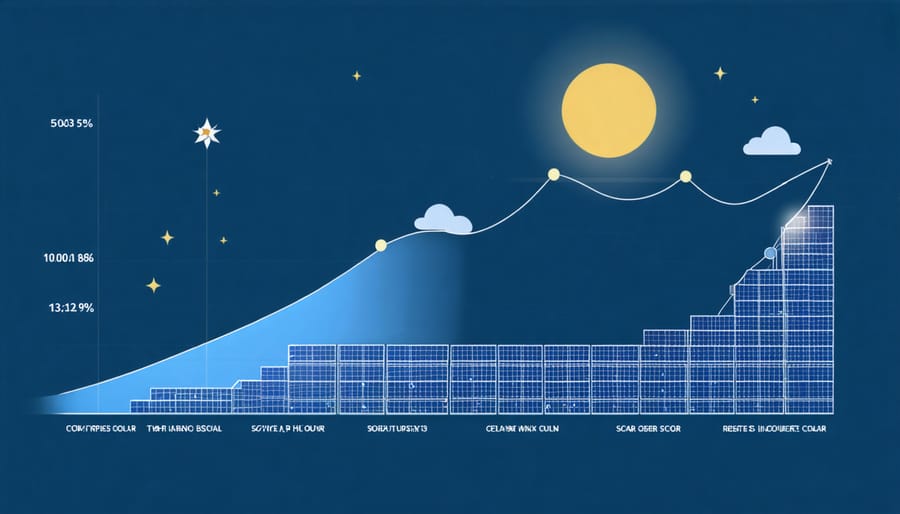Solar energy marketing stands at the intersection of innovation and necessity, transforming how we power our future while creating unprecedented business opportunities. As global demand for renewable energy surges and installation costs continue to drop, the solar industry presents a unique marketing landscape where environmental benefits align perfectly with economic advantages.
The solar energy sector’s explosive growth – projected to reach $223.3 billion by 2026 – has created a dynamic marketing environment where traditional consumer concerns about cost and complexity are giving way to enthusiasm for energy independence and sustainable living. Today’s solar marketers face the exciting challenge of bridging the gap between advanced technology and everyday homeowners, translating complex technical benefits into compelling value propositions that resonate with both environmental and financial sensibilities.
For businesses and professionals entering this space, understanding the unique blend of technical knowledge, consumer psychology, and environmental awareness is crucial. The key to successful solar marketing lies in effectively communicating both immediate financial benefits and long-term environmental impact, while addressing common misconceptions that might hinder adoption.
Why Solar Marketing is Booming Right Now
Market Growth Statistics
The solar energy market continues to experience remarkable growth, creating abundant sustainable career opportunities across the sector. Recent data from the Solar Energy Industries Association (SEIA) shows that the U.S. solar market has grown by an average of 33% annually over the past decade. In 2023, residential solar installations reached record highs, with over 700,000 American homes adding solar panels to their properties.
Industry forecasts predict even stronger growth ahead, with the global solar energy market expected to triple in size by 2030. This expansion is driven by declining installation costs, improved technology, and increasing environmental awareness among consumers. Residential solar installations are projected to grow by 25% annually through 2027, while commercial installations are expected to maintain a steady 20% yearly growth rate.
These impressive statistics reflect growing consumer confidence in solar energy as a reliable, cost-effective power solution for homes and businesses alike.

Consumer Demand Trends
Recent surveys show that homeowners are increasingly prioritizing sustainable energy solutions, with solar power leading the way. This shift reflects growing environmental awareness and a desire for energy independence. As the evolving industry landscape continues to mature, consumers are becoming more educated about solar benefits and investment potential.
Price sensitivity remains a key factor, but many homeowners now view solar installation as a long-term investment rather than an expense. The desire to reduce monthly utility bills, combined with increased awareness of environmental impacts, drives decision-making. Solar adoption is particularly strong among millennials and Gen X homeowners, who often prioritize sustainable living and energy efficiency.
Consumer research indicates that ease of installation, warranty coverage, and clear financial benefits are the top priorities for potential solar customers. The trend toward smart home integration and energy monitoring capabilities has also emerged as a significant factor in purchase decisions, reflecting broader technological adoption in home management.
Essential Skills for Solar Marketing Success
Technical Knowledge Requirements
To effectively market solar energy solutions, professionals need a solid foundation in basic solar technology concepts. Understanding how solar technology innovations work helps marketers communicate value propositions clearly to potential customers. Key knowledge areas include understanding different types of solar panels, basic system components like inverters and batteries, and how weather patterns affect solar production.
Marketers should familiarize themselves with common installation methods, energy storage solutions, and grid connection basics. This knowledge enables them to address customer concerns confidently and explain benefits effectively. While deep technical expertise isn’t necessary, understanding fundamental concepts about solar efficiency, panel orientation, and energy output calculations is essential.
It’s also important to stay current with industry trends, including new product developments and emerging technologies. This allows marketers to highlight the most relevant features and benefits to potential customers. Knowledge of local solar incentives, tax benefits, and regulatory requirements further strengthens their ability to present compelling solutions to homeowners.
Marketing and Communication Skills
In today’s digital age, effective marketing of solar energy requires a diverse set of communication skills. Social media management plays a crucial role, allowing marketers to showcase solar installations, share customer success stories, and educate audiences about renewable energy benefits. Content creation skills are essential for developing engaging blog posts, videos, and infographics that explain solar technology in simple terms.
Email marketing remains a powerful tool for nurturing leads and maintaining customer relationships. Marketers should craft compelling newsletters highlighting energy savings, environmental impact, and new solar innovations. Customer engagement through various channels requires excellent interpersonal skills and the ability to address concerns promptly and professionally.
Digital advertising expertise, including Google Ads and social media advertising, helps reach targeted audiences interested in solar solutions. Understanding analytics and metrics allows marketers to track campaign performance and adjust strategies accordingly. Public speaking and presentation skills are valuable for community events and client meetings, where explaining solar benefits and ROI becomes crucial.
The ability to create clear, persuasive proposals and marketing materials that emphasize both environmental and financial benefits is fundamental to successful solar energy marketing.
Popular Solar Marketing Career Paths

Digital Marketing Specialist
Digital Marketing Specialists in solar energy focus on creating compelling online campaigns that showcase the benefits of solar power to potential customers. They manage social media platforms, develop engaging content, and implement SEO strategies to increase visibility for solar companies. These professionals craft targeted email campaigns, manage pay-per-click advertising, and analyze data to optimize marketing efforts.
Key responsibilities include creating educational blog posts about solar benefits, developing lead generation strategies, and maintaining a strong online presence across various digital platforms. They also collaborate with sales teams to nurture leads and track conversion rates. Success in this role requires staying current with digital marketing trends, understanding the solar industry, and effectively communicating the value proposition of solar energy to different audience segments.
A Digital Marketing Specialist must balance technical knowledge with creative storytelling to help homeowners understand how solar power can benefit their lives and finances.
Content Strategy Manager
A Content Strategy Manager in solar marketing plays a crucial role in educating potential customers and building brand trust. They develop compelling narratives that highlight the benefits of solar energy while making complex technical information accessible to homeowners. Their responsibilities include creating blog posts, social media content, newsletters, and video scripts that showcase solar solutions’ environmental and financial advantages.
These professionals work closely with design teams to ensure visual content aligns with messaging, maintain consistent brand voice across all platforms, and develop content calendars that address seasonal energy concerns. They also analyze content performance metrics to optimize engagement and lead generation. Success in this role requires excellent storytelling abilities, knowledge of SEO best practices, and a deep understanding of both renewable energy trends and consumer pain points around energy costs and sustainability.
Community Engagement Coordinator
A Community Engagement Coordinator plays a vital role in connecting solar energy companies with local neighborhoods and organizations. This position involves organizing educational workshops, attending community events, and building partnerships with local businesses and environmental groups. They work to address community concerns, showcase the benefits of solar adoption, and create grassroots support for renewable energy initiatives.
These professionals also coordinate with homeowners’ associations, local government officials, and environmental advocacy groups to promote solar awareness. They develop outreach programs that highlight both environmental and economic advantages of solar power, making the technology more accessible and appealing to diverse communities. By fostering trust and understanding, they help overcome common misconceptions about solar energy and create lasting relationships that drive sustainable community development.
Through strategic communication and relationship building, Community Engagement Coordinators serve as the bridge between solar companies and the communities they serve, ensuring successful project implementation and long-term community support.
Sales enablement Specialist
Sales enablement specialists play a crucial role in bridging the gap between marketing and sales teams in the solar industry. They create and maintain comprehensive resource libraries filled with customer testimonials, product specifications, and pricing guides that help sales teams close deals more effectively. These specialists develop targeted presentation materials, proposal templates, and digital tools that simplify the solar sales process for both representatives and potential customers.
By analyzing market trends and customer feedback, they continuously refine sales materials to address common customer concerns and highlight the most compelling benefits of solar adoption. They also organize training sessions and workshops to keep sales teams updated on new products, competitive advantages, and effective selling techniques. Their work ensures that sales representatives have everything they need to confidently present solar solutions to homeowners and businesses, ultimately driving higher conversion rates and customer satisfaction.
Breaking Into Solar Marketing
Education and Certification Options
For those looking to excel in solar energy marketing, several educational paths and certifications can boost your credentials. A bachelor’s degree in marketing, business, or environmental science provides a strong foundation. Many professionals also pursue specialized courses in renewable energy marketing through organizations like the Solar Energy International (SEI) or the North American Board of Certified Energy Practitioners (NABCEP).
Key certifications include the NABCEP PV Technical Sales Certification, which demonstrates expertise in solar system design and customer relations. Digital marketing certifications from platforms like Google or HubSpot help develop crucial online marketing skills. Local solar associations often offer specialized training programs focusing on regional markets and regulations.
Consider pursuing continuing education in sustainable energy through community colleges or online platforms. These programs often cover solar technology basics, sales techniques, and current market trends. Many employers value a combination of formal education and practical experience, making internships and entry-level positions valuable stepping stones in your career development.
Networking and Industry Events
Connecting with industry professionals is crucial for success in solar energy marketing. Start by joining organizations like the Solar Energy Industries Association (SEIA) and attending their regular conferences and trade shows. Local sustainability fairs and green energy expos offer excellent opportunities to meet potential clients and partners while staying updated on industry trends.
LinkedIn groups focused on renewable energy and solar power provide valuable virtual networking spaces. Consider participating in webinars and online forums where industry experts share insights and best practices. Local chambers of commerce often host green business events, creating perfect venues for meeting fellow professionals and potential customers.
Don’t overlook solar installation training sessions and certification programs, which often attract industry professionals and decision-makers. These events not only enhance your knowledge but also help build meaningful connections. Remember to follow up with new contacts and maintain relationships through regular communication and social media engagement.

As we’ve explored throughout this article, the solar energy market presents an exciting and rewarding opportunity for marketing professionals. With increasing environmental awareness, favorable government incentives, and dropping installation costs, there’s never been a better time to enter this dynamic field. The key to success lies in understanding both the technical aspects of solar solutions and the diverse needs of potential customers.
For those looking to start their journey in solar marketing, begin by developing a strong foundation in digital marketing techniques, familiarizing yourself with renewable energy policies, and building connections within the industry. Consider joining professional organizations, attending solar conferences, and obtaining relevant certifications to enhance your credibility.
Remember that successful solar marketing isn’t just about selling panels – it’s about helping people make informed decisions that benefit both their finances and the environment. By focusing on education, transparency, and genuine value creation, you can build a rewarding career while contributing to a more sustainable future.
The solar industry continues to evolve rapidly, offering endless possibilities for innovative marketing approaches and career growth. Take the first step today by implementing the strategies discussed in this guide, and you’ll be well-positioned to succeed in this flourishing sector.









